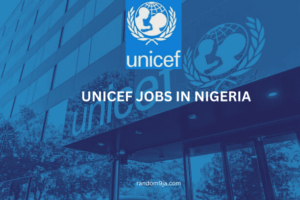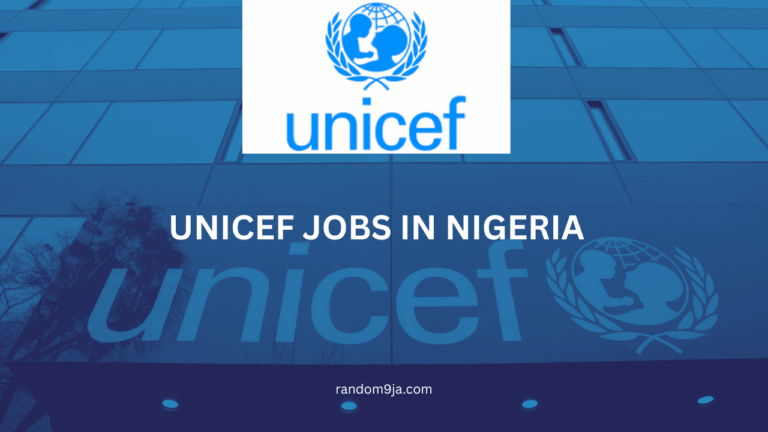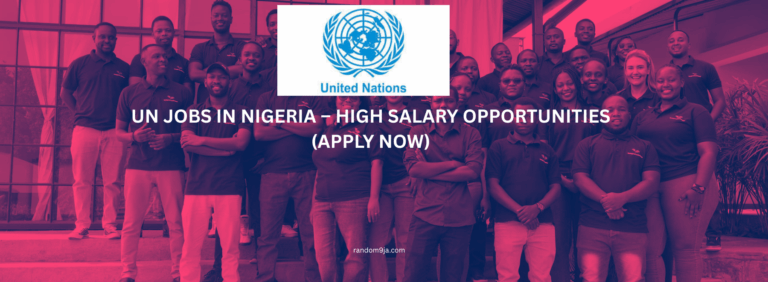UNICEF Jobs in Nigeria 2026 – Apply Now

If you’re passionate about humanitarian work, community development, public health, education, and social impact, working with UNICEF offers a fulfilling and meaningful career path. This article serves as a complete guide for anyone seeking to understand how UNICEF recruitment works in Nigeria, including job types, requirements, salaries, application steps, and career growth opportunities.
Understanding UNICEF’s Work in Nigeria
UNICEF has operated in Nigeria since 1952, collaborating with the Federal Government, state ministries, NGOs, international partners, and local communities. Their programs focus on six major areas:
1. Health and Nutrition
UNICEF supports maternal, newborn, and child health initiatives, vaccination programs, and nutrition interventions to combat malnutrition.
2. Education
The organization promotes inclusive and quality education, helping children—especially girls—access learning opportunities.
3. WASH (Water, Sanitation, and Hygiene)
UNICEF strengthens access to clean water, sanitation facilities, and hygiene awareness campaigns across Nigeria.
4. Child Protection
Through advocacy and direct support, UNICEF fights against child trafficking, child labor, violence, abuse, and exploitation.
5. Social Policy and Research
The agency conducts surveys, policy development, and data-driven planning to improve government decision-making.
6. Emergency Response
UNICEF provides immediate relief during crises such as disease outbreaks, conflicts, and natural disasters.
Because of these extensive operations, UNICEF regularly hires qualified individuals for different technical and administrative roles across Nigeria.
Why UNICEF Jobs in Nigeria Are Highly Sought After
Working for UNICEF is more than a job—it is a chance to make a lasting difference. Here are some reasons Nigerians actively pursue careers in the organization:
-
Competitive salaries and benefits
-
International exposure and travel opportunities
-
Training and career development support
-
Meaningful work with real community impact
-
Multicultural and inclusive work environment
-
Opportunities for long-term career growth at the UN
Whether you are a fresh graduate or a seasoned professional, UNICEF provides pathways for career-building and global relevance.
UNICEF Recruitment Portal for Jobs in Nigeria
All UNICEF job openings are listed on the official career platform. Applicants must apply online. UNICEF does not charge application fees, and they do not accept applications through agents or unofficial portals.
On the portal, candidates can view:
-
Open vacancies
-
Consultant positions
-
Temporary appointments
-
National and international positions
-
Internship opportunities
Types of UNICEF Jobs in Nigeria
UNICEF offers various job categories depending on program needs. These include:
1. Program and Technical Roles
These are core positions responsible for delivering UNICEF’s mission. They include:
-
Health Specialists
-
Nutrition Officers
-
Education Specialists
-
Child Protection Officers
-
WASH Engineers
-
Social Policy Analysts
-
Monitoring and Evaluation Specialists
-
Communication for Development (C4D) Officers
-
Humanitarian Response Coordinators
Such roles typically require technical expertise and field experience.
2. Administrative and Operations Roles
These support UNICEF’s daily and long-term operations. Roles include:
-
Administrative assistants
-
Supply chain officers
-
Finance analysts
-
Procurement specialists
-
HR officers
-
Logistics officers
-
Office managers
3. ICT and Digital Innovation Roles
To strengthen technology-driven solutions, UNICEF recruits:
-
ICT officers
-
Data scientists
-
Information management specialists
-
Cybersecurity analysts
-
GIS analysts
These roles support digital projects, research, and emergency response activations.
4. Internships
UNICEF offers internship opportunities for students and fresh graduates. These internships help young professionals gain real-world experience in:
-
Research
-
Program administration
-
Communications
-
Data analysis
-
Monitoring and evaluation
5. Consultancy Roles
For short-term assignments, UNICEF hires consultants in fields such as:
-
Public health
-
Education
-
Nutrition
-
Social policy
-
Research and surveys
-
Report writing
-
Technical advisory
Consultants are usually paid based on deliverables and contract duration.
General Requirements for UNICEF Jobs in Nigeria
Each role has its own qualifications, but these are the general requirements:
1. Educational Background
UNICEF jobs typically require:
-
Bachelor’s degree
-
Master’s degree (preferred for senior roles)
-
PhD (for specialized research and policy roles)
Relevant fields include:
-
Public health
-
Education
-
Social sciences
-
International relations
-
Economics
-
Statistics
-
Engineering
-
Nutrition
-
Medicine
-
Media and communications
-
Child development
2. Professional Experience
Depending on the role:
-
Entry-level: 0–2 years
-
Mid-level: 3–5 years
-
Senior-level: 6–10+ years
-
Consultants: proven expertise in the specific area
Experience working with NGOs, UN agencies, or international organizations is a major advantage.
3. Skills and Competencies
Applicants must demonstrate:
-
Strong communication skills
-
Analytical and problem-solving abilities
-
Ability to work with diverse teams
-
Knowledge of program management
-
Monitoring and evaluation skills
-
Research competence
-
Proficiency in Microsoft Office and digital tools
-
Ability to work under pressure
4. Language Skills
English is mandatory. Knowledge of local languages such as Hausa, Yoruba, and Igbo is an advantage—especially for field positions.
5. Personal Qualities
UNICEF seeks individuals who demonstrate:
-
Integrity
-
Teamwork
-
Respect for diversity
-
Commitment to humanitarian principles
-
Professionalism
-
Flexibility
Documents Needed to Apply for UNICEF Jobs
Applicants must prepare the following documents:
-
Updated CV or resume
-
Cover letter
-
Academic certificates
-
Professional certifications
-
National ID or passport
-
Portfolio (for communication roles)
-
UN Personal History Form (P11)
Ensure all documents are clear, correctly scanned, and professionally labelled.
How to Apply for UNICEF Jobs in Nigeria
A successful application requires following the correct steps:
Step 1: Visit the UNICEF Career Portal
Navigate to the official job board.
Step 2: Search for Available Positions
Filter by:
-
Country: Nigeria
-
Job type
-
Category
-
Contract length
Step 3: Read Job Descriptions Carefully
Make sure you meet the required qualifications.
Step 4: Prepare Your CV and Cover Letter
Tailor them to match the responsibilities of the position.
Step 5: Submit Your Application Online
Fill out the application form accurately and upload required documents.
Step 6: Monitor Your Email
Shortlisted candidates receive further instructions via email.
UNICEF Recruitment Process in Nigeria
The hiring process usually includes:
1. Application Screening
HR reviews CVs and shortlists suitable candidates.
2. Competency-Based Assessments
These may include:
-
Written tests
-
Case studies
-
Simulations
-
Problem-solving tasks
3. Technical Interview
A panel evaluates your knowledge of the role and your experience.
4. Behavioral Interview
Questions focus on:
-
Teamwork
-
Communication
-
Integrity
-
Adaptability
5. Reference Checks
UNICEF contacts previous employers to verify experience.
6. Final Selection
Successful candidates receive an offer.
UNICEF Salary Structure in Nigeria
UNICEF salaries are highly competitive and depend on:
-
Grade level
-
Job type
-
Experience
-
Contract type
Below is an estimated range:
Interns
₦80,000 – ₦150,000 monthly (depending on project)
Entry-Level Professional Staff (NOA Level)
₦500,000 – ₦900,000 monthly
Mid-Level Staff (NOB/NOC Level)
₦1,000,000 – ₦2,500,000 monthly
Senior-Level Experts (P-Level)
₦3,000,000 – ₦6,000,000+ monthly
Additional Benefits Include:
-
Housing allowance
-
Health insurance
-
Paid leave
-
Pension contributions
-
Hazard and field allowances
-
Travel allowance
-
Opportunities for international training
UNICEF Office Locations in Nigeria
UNICEF operates in the following states:
-
Abuja (Country Office)
-
Lagos
-
Kano
-
Enugu
-
Maiduguri
-
Sokoto
-
Bauchi
-
Kaduna
-
Rivers
-
Ebonyi
Field staff are deployed according to program needs.
Tips for Increasing Your Chances of Getting a UNICEF Job
UNICEF positions are highly competitive, but you can improve your chances by following these strategies:
1. Tailor Your CV to the UN Format
Highlight measurable achievements.
2. Get Relevant Certifications
Examples:
-
Project Management (PMP)
-
Monitoring & Evaluation
-
Nutrition certifications
-
Public health training
-
Data science tools
-
Humanitarian response training
3. Gain Field Experience
Experience working with:
-
NGOs
-
Development agencies
-
Community initiatives
is highly valued.
4. Prepare for Competency-Based Interviews
Use the STAR method:
-
Situation
-
Task
-
Action
-
Result
5. Apply for Internships or Consultancies
These improve your chances of being hired full-time.
6. Apply Early
Late applications may not be reviewed.
7. Respect the Application Instructions
UNICEF values precision and professionalism.
Common Mistakes Applicants Make
Avoid:
-
Submitting a generic CV
-
Applying for roles you’re unqualified for
-
Ignoring the job description
-
Misspelling or grammar errors
-
Using an unprofessional email
-
Submitting incomplete applications
Read Also: EFCC Recruitment 2026/2027 – Apply Now
UNICEF Jobs in Nigeria offer a rare opportunity to work with one of the world’s most impactful organizations. With programs that touch millions of lives, UNICEF remains a top employer for professionals passionate about humanitarian work, child welfare, education, public health, and community development.





